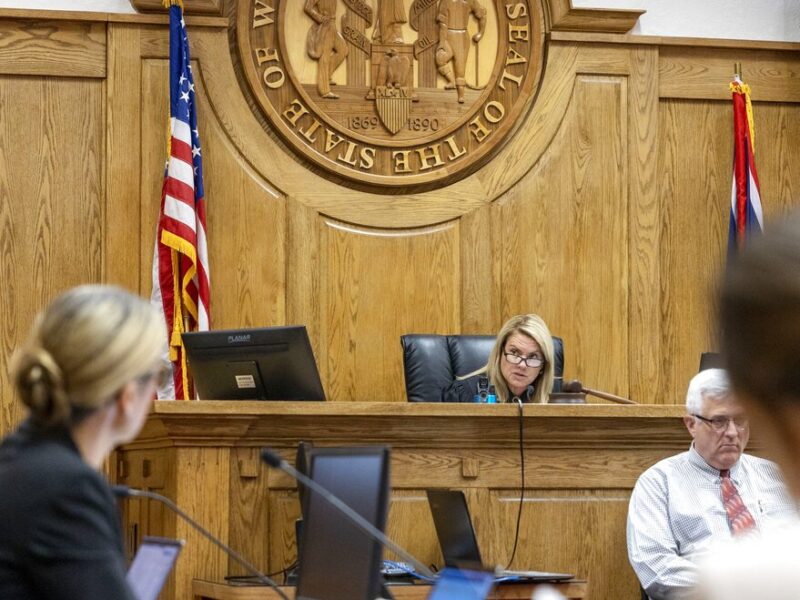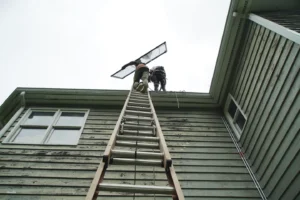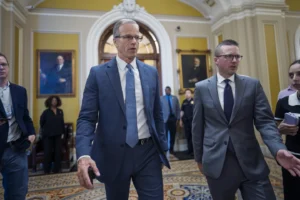Wyoming Judge Sends Abortion Ban Case to State Supreme Court, Blocks Intervenors
Abortions to remain legal while Wyoming’s highest court considers whether to accept the matter
- Published In: Politics
- Last Updated: Dec 01, 2022

Teton County District Court Judge Melissa Owens ruled Wednesday that the question of whether Wyoming's near-total abortion ban is constitutional should be decided by the state Supreme Court. (Bradly J. Boner/Jackson Hole News & Guide via AP, Pool)
By Jacob Gardenswartz
Special to the Wyoming Truth
The lawsuit against Wyoming’s criminal abortion ban is headed to the state Supreme Court, a judge ruled Wednesday, finding that questions concerning the constitutionality of a 2022 law banning most abortions in Wyoming had no existing legal precedent.
In a separate ruling Wednesday evening, Teton County District Court Judge Melissa Owens also denied the request by two state legislators behind the abortion ban and an anti-abortion nonprofit to join the case and help the state defend the law. Owens had previously ruled in August that the plaintiffs seeking to block the law — a coalition of Wyoming residents, reproductive health medical professionals and an abortion fund — could “likely succeed” in showing that the law violated the Wyoming Constitution.

Owens’ order certifying the case to the Wyoming Supreme Court ensures abortion will remain legal in the state while the Court considers whether to accept the matter, something the justices must decide within 30 days. Legal experts had previously told the Wyoming Truth they expected the Court to weigh in on the matter, and predicted the plaintiffs would have a high probability of success at striking down the law.
John Robinson, one attorney representing the plaintiffs in the case, declined to comment on Owens’ rulings. Representatives for Attorney General Bridget Hill, who’s tasked with enforcing the law, also declined to comment, citing their policy not to speak about pending litigation.
“We look forward to the Wyoming Supreme Court’s response to Judge Owen’s Certification Order in the Johnson v. State suit challenging the constitutionality of the State’s recently adopted abortion law,” said Michael Pearlman, a spokesman for Gov. Mark Gordon, in a statement to the Wyoming Truth. “This follows the State’s motion requesting this certification made in August.”
“Regardless of the Supreme Court’s response, the Attorney General will continue to defend the constitutionality of this law,” Pearlman’s statement continued.
In her order sending the matter to the state Supreme Court, Owens wrote that the case “involves questions of law which will be determinative of the cause and concerning which it appears there is no controlling precedent in the decisions of the Wyoming Supreme Court.” She went on to enumerate 12 specific questions for the Court, including whether HB 92 violated multiple provisions in the Wyoming Constitution, if it was “unconstitutionally vague” and if it violated Wyoming citizens’ right to privacy.
Intervenors’ interests not enough to join case
Owens’ second order considered whether nonprofit Right to Life Wyoming and Wyoming Reps. Rachel Rodriguez-Williams (R-Cody) and Chip Neiman (R-Hulett), who sponsored the March law, could join the case. Owens agreed that the legislators have an “important” interest in ensuring that the law is executed, but found those are “nonetheless indirect and contingent interests for purposes of intervention.” While the legislators also had argued they have a personal interest in the matter given their anti-abortion beliefs, Owens noted that those “personal convictions are not different from any Wyoming citizen’s interest in seeing legislation enacted that promotes the health, welfare, and safety of Wyoming’s citizens.”
Owens also argued that the intervenors failed to demonstrate why their positions were not adequately represented by the state of Wyoming, which is defending the law in court, as all interested parties have the “same objective” in the case.
Enabling the intervenors to join the case, Owens wrote, would “unduly delay the adjudication of the rights of the parties.” She noted the legislators as well as the nonprofit are free to continue their anti-abortion advocacy as the matter proceeds through the legal system.
Neither Reps. Rodriguez-Williams, Neiman nor representatives for Right to Life Wyoming immediately responded to requests for comment. In a statement to the Wyoming Truth, a representative of the Alliance Defending Freedom, who represented the intervenors, said they are “hopeful that the state will prevail so it can protect the most vulnerable among us and ensure that women and families facing unplanned pregnancies have real support.”
Owens’ decisions come as the question of abortion’s legality continues to dominate political debates both in Wyoming and around the country. Democrats’ surprising success in last month’s midterm elections, in which they retained control of the U.S. Senate and narrowly lost the House majority, was widely attributed to a backlash against the U.S. Supreme Court’s decision last June to overturn the constitutional right to abortion.
And though abortion rights remain widely popular at the national level, opinions in Wyoming are more mixed. Survey data from the University of Wyoming published Wednesday showed 36% of respondents view abortion as a matter of personal choice, while a similar 36% say abortion should be acceptable only in cases of rape, incest or if the pregnancy poses significant health risks.
Another 19% of respondents say abortion should be allowed if there is a clear reason for the procedure, while 7% say abortion should be banned outright. Such opinions have remained relatively unchanged over the past 20 years, wrote Jim King, University of Wyoming professor of political science and the survey’s director.













